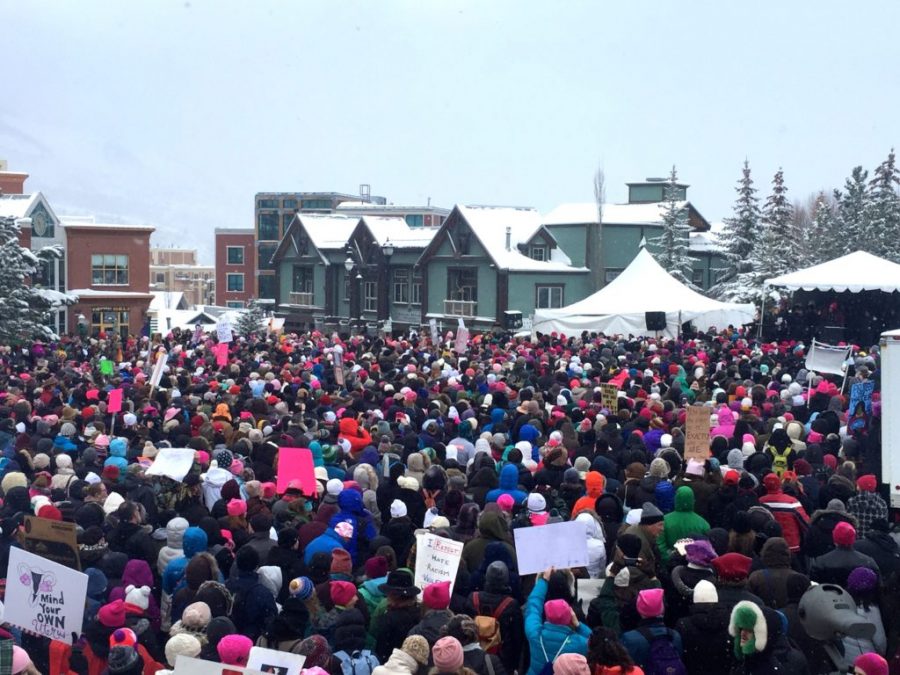A sea of pink hats and posters flooded the streets of Park City Saturday morning in protest of recently inaugurated President Donald Trump.
Four U students from the College of Social Work waited at a bus stop five miles from Main Street, the starting point of the march, and held a sign that read “Utah for Gender Justice.”
The students passed around a poster asking other protesters and film enthusiasts to fill in the blank in the phrase “I fight for ____.”
“We want the whole damn dollar,” another sign read.
Happening congruently with the 2017 Sundance Film Festival, the rally drew an estimated crowd of 8,000 community members, festival goers and celebrities.
Chelsea Handler, a comedian who spearheaded the event, joined marchers to advocate equal rights for all people, especially women.
“[I’m here to] demonstrate respect for our freedom, human rights and our health,” Handler said to a crowd rallying in a parking lot. “Otherwise known as: things we thought we were done marching for.”
The number of people in downtown Park City, which has a population of roughly 8,000, quickly outgrew estimates, causing all shuttle bus lines leading into the city before 10 a.m. to be canceled.
More dynamic speakers at the Women’s March on Main were film producer Laurie David, civil rights activist Dolores Huerta and filmmaker Mary McCormack.
Huerta, the co-founder of United Farm Workers who coined the term “sí, se puede” which translates to “yes, we can,” lead the masses in a chant saying, “We will not go back.”
David said she chose to march in Park City rather than Washington, D.C. to symbolize a long battle for climate change advocacy. The sequel to her film “An Inconvenient Truth,” fittingly called “An Inconvenient Sequel,” debuted at Sundance on Thursday — 10 years after the first film.
“It’s science,” David charged into the crowd.
Celebrities spotted in the masses were John Legend, Jennifer Beals and Charlize Theron.
Many of the protesters showed their support for Planned Parenthood with t-shirts, buttons and signs.
Planned Parenthood is an institution that’s synonymous with the health and safety of millions of women, McCormack told the crowd.
The health-care clinic that provides services for 2.5 million people a year has “always had our backs,” Handler said. “And it needs our support now more than ever.”
The four U students said they were standing up for all women, not just the ones that share their political stance.
“There’s a lot of women that are so oppressed and completely unaware of it,” said Cristina Pena, a student in social work. “If they weren’t in that situation, they might be here with us today.”
A handful of students from Medical Students For Choice (MSFC), a student organization that works to improve reproductive health curricula among medical schools, also attended the march.
Katelyn Steele, Chapter president for MSFC at the U’s School of Medicine, said about women’s marches across the U.S., “It was an opportunity for my family to be together even though we are scattered throughout the country.”
Steele’s sister marched in Washington, D.C., alongside upwards of an estimated 500,000, while her mother knitted pink hats in North Carolina.
The women and men demonstrating in streets across the country and the world Saturday yearn for a unified goal, Steele said.
“We want cleaner air, we want better pay, we want control of our bodies,” Steele said. “We refuse to be treated as anything but equals.”
k.buda@dailyutahchronicle.com
@kttbuda


